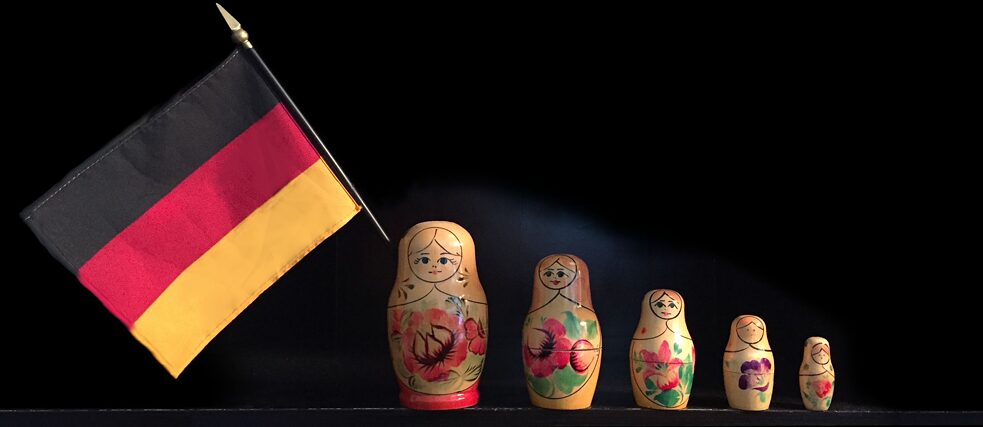German Literature
(Ge)bor(e)n in the USSR

Novels by German writers of Soviet-Jewish backgrounds have stood out in the literary and general fiction world since the 2000s. Why are these stories of identity and hybridity so compelling?
By Raleigh Joyner
“We’re living in a den of thieves,
Rummaging for answers in the pages...”
- “Us,” Regina Spektor (American musician, born 1980 in Moscow to Russian Jews; immigrated to the United States in 1989), from her debut album Soviet Kitsch (2004)
For some folks, the 1980s may be a decade recalled in neon, backed by a soundtrack of German crossover acts like Kraftwerk, Nena, and Einstürzende Neubauten. American pop giants like Madonna, Prince, and Michael Jackson come to mind, the aerobics craze, Werner Herzog and Wim Wenders films.
For other folks, though, many memories are slate grey, recollections of low, dun-colored concrete apartment buildings against smoggy skies, the voices of Gorbachev, Honecker, Reagan, and Kohl on the radio. The promises of perestroika and glasnost, the Chernobyl disaster, the charming kitsch of late-Cold War socialist interior décor. For many Jewish German-language writers from the former Soviet Union – whose voices and works presently occupy a significant subgenre of fiction literature – these impressions comprise a large portion of the 1980s they knew. It was their lived reality as young Soviet Jews who left the former USSR as teenagers, children, even as babies. They relocated to the West as refugees, and grew up in big cities, large towns, and small villages throughout Germany. The otherworldly landscape of their earliest years remained behind, but for German writers with Soviet Jewish backgrounds, it is far from forgotten.
As the Soviet Union gradually declined throughout the 1980s, a worsening climate of antisemitism throughout the USSR gave rise to refugee resettlement programs enabling Soviet Jews to apply for exit visas and emigrate. Many of them were bound for the United States, Canada, Israel, and Germany. Following the fall of the Berlin Wall in 1989, emigration became mass exodus. About 1.6 million Jews streamed out of the former USSR; this migration wave persisted through the 1990s and well into the mid-2000s.
Of those 1.6 million refugees, 979,000 people relocated to Israel under the Law of Return – a Zionist movement-informed law that guarantees Jewish diaspora worldwide the right to enter and settle in Israel, if they are able to prove their Jewish heritage. Not all refugees had their sights set on Israel, however. 325,000 more, mostly Ashkenazi Jews, passed through Vienna (which was a central hub for refugee Jews in transit) and continued on to the United States, while yet another 219,000 relocated to Germany.
Among those who ended up in Germany, of course, were future novelists, musicians, poets, dramatists, performance artists, journalists, and more. They passed between the German-speaking spaces of the public sphere – classrooms, workplaces, bureaucratic offices – and the Russian-speaking spaces of their homes, where it was not unusual for children, parents, grandparents, great-grandparents, aunts, and uncles to all live together in the same flat or house. The homes of Soviet-Jewish families in Germany forged a hybridity that was at once conflicting – German, Jewish, Russian, so many seemingly at-odds forces bundled into one person, existing as seemingly opposing facets of a single individual’s identity – and beautifully profound.
The beauty in this hybridity is highlighted in no shortage of works that have emerged from German-language writers of Soviet-Jewish heritage: Sasha Marianna Salzmann, Wladimir Kaminer, Katja Petrowskaja, Olga Grjasnowa, Julya Rabinowich (Austria), Nino Haratischwili, Lena Gorelik, and many more yet-unpublished writers – whose debut novels (there must be a few brilliant new ones each year at this point, released to enormous acclaim) continue to enchant German-language readers and find considerable readership in their English translations as well.
Creative and perceptive, these writers have a natural gift for looking backwards at the world into which they were born, outward at the one in which they grew up (or to which they moved as young adults), and then inward at themselves, interrogating their identities, searching for answers about who they are, how they came to be, and why it all somehow works. From socialism to capitalism, from Baku to Hesse, kvass to Coca-Cola, samovars to sauerkraut – that’s enough – it is no surprise that such a great amount of supposedly contradictory and diametrically-opposed elements, within one single person, could elicit such a knack for introspection, complexity, and wisdom in the written word.
In the series “(Ge)bor(e)n in the USSR,” I will take a closer look at three German-language debut works from writers of Soviet Jewish origin: Außer sich (Beside Myself) by Sasha Marianna Salzmann; Der Russe ist einer, der Birken liebt (All Russians Love Birch Trees) by Olga Grjasnowa; and Russendisko (Russian Disco) by Wladimir Kaminer.